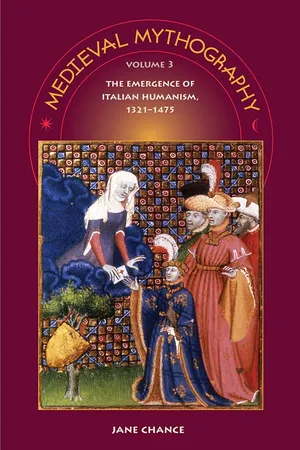
- 698 pages
- English
- PDF
- Available on iOS & Android
About this book
With this volume, Jane Chance concludes her monumental study of the history of mythography in medieval literature. Her focus here is the advent of hybrid mythography, the transformation of mythological commentary by blending the scholarly with the courtly and the personal.
Chance's in-depth examination of works by the major writers of the period—including Dante, Boccaccio, and Christine de Pizan—demonstrates how they essentially co-opted a thousand-year tradition. Their intricate narratives of identity mixed commentary with poetry; reinterpreted classical gods and heroes to suit personal agendas; and gave rise to innovative techniques such as "inglossation," the use of a mythological figure to comment on the protagonist within an autobiographical allegory. In this manner, through allegorical authorial projection of the self, the poets explored a subjective world and manifested a burgeoning humanism that would eventually come to full fruition in the Renaissance.
No other work examines the mythographic interrelationships between these poets and their unique and personal approaches to mythological commentary.
Frequently asked questions
- Essential is ideal for learners and professionals who enjoy exploring a wide range of subjects. Access the Essential Library with 800,000+ trusted titles and best-sellers across business, personal growth, and the humanities. Includes unlimited reading time and Standard Read Aloud voice.
- Complete: Perfect for advanced learners and researchers needing full, unrestricted access. Unlock 1.4M+ books across hundreds of subjects, including academic and specialized titles. The Complete Plan also includes advanced features like Premium Read Aloud and Research Assistant.
Please note we cannot support devices running on iOS 13 and Android 7 or earlier. Learn more about using the app.
Information
Table of contents
- Cover
- Contents
- Illustrations
- Tables
- Acknowledgments
- Abbreviations and Citation Editions
- Chronology of Medieval Mythographers and Commentary Authors
- Introduction
- Chapter One. Toward a Subjective Mythography: Allegorical Figurae and Authorial Self-Projection
- Chapter Two. Dante’s Self-Mythography: The Inverted Ovid “Commentary” of the Commedia (1321) and Its Family Glosses
- Chapter Three. “Iohannes de Certaldo”: Self-Validation in Boccaccio’s “Genealogies of the Gods” (ca. 1350–75)
- Chapter Four. Franco-Italian Christine de Pizan’s Epistre Othea (1399–1401): A Feminized Commentary on Ovid
- Chapter Five. Christine de Pizan’s Illuminated Women in the Cité des Dames (1405)
- Chapter Six. Coluccio Salutati’s Hercules as Vir Perfectus: Justifying Seneca’s Hercules Furens in De Laboribus Herculis (1378?–1405)
- Chapter Seven. Cristoforo Landino’s “Judgment of Aeneas” in the Disputationes Camaldulenses (1475)
- Conclusion
- Notes
- Bibliography
- Index